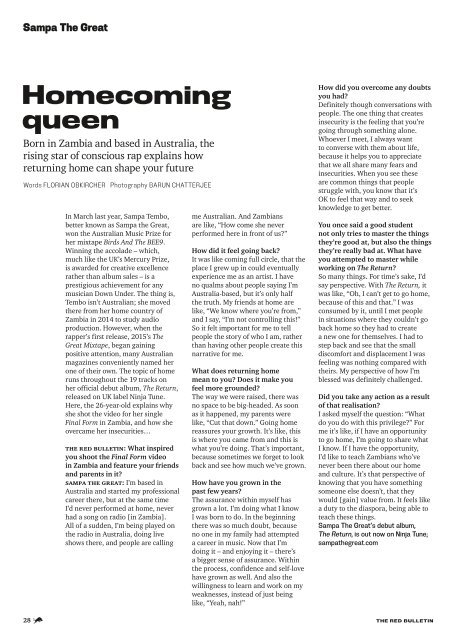Create successful ePaper yourself
Turn your PDF publications into a flip-book with our unique Google optimized e-Paper software.
Sampa <strong>The</strong> Great<br />
Homecoming<br />
queen<br />
Born in Zambia and based in Australia, the<br />
rising star of conscious rap explains how<br />
returning home can shape your future<br />
Words FLORIAN OBKIRCHER Photography BARUN CHATTERJEE<br />
In March last year, Sampa Tembo,<br />
better known as Sampa the Great,<br />
won the Australian Music Prize for<br />
her mixtape Birds And <strong>The</strong> BEE9.<br />
Winning the accolade – which,<br />
much like the <strong>UK</strong>’s Mercury Prize,<br />
is awarded for creative excellence<br />
rather than album sales – is a<br />
prestigious achievement for any<br />
musician Down Under. <strong>The</strong> thing is,<br />
Tembo isn’t Australian; she moved<br />
there from her home country of<br />
Zambia in 2014 to study audio<br />
production. However, when the<br />
rapper’s first release, 2015’s <strong>The</strong><br />
Great Mixtape, began gaining<br />
positive attention, many Australian<br />
magazines conveniently named her<br />
one of their own. <strong>The</strong> topic of home<br />
runs throughout the 19 tracks on<br />
her official debut album, <strong>The</strong> Return,<br />
released on <strong>UK</strong> label Ninja Tune.<br />
Here, the 26-year-old explains why<br />
she shot the video for her single<br />
Final Form in Zambia, and how she<br />
overcame her insecurities…<br />
the red bulletin: What inspired<br />
you shoot the Final Form video<br />
in Zambia and feature your friends<br />
and parents in it?<br />
sampa the great: I’m based in<br />
Australia and started my professional<br />
career there, but at the same time<br />
I’d never performed at home, never<br />
had a song on radio [in Zambia].<br />
All of a sudden, I’m being played on<br />
the radio in Australia, doing live<br />
shows there, and people are calling<br />
me Australian. And Zambians<br />
are like, “How come she never<br />
performed here in front of us?”<br />
How did it feel going back?<br />
It was like coming full circle, that the<br />
place I grew up in could eventually<br />
experience me as an artist. I have<br />
no qualms about people saying I’m<br />
Australia-based, but it’s only half<br />
the truth. My friends at home are<br />
like, “We know where you’re from,”<br />
and I say, “I’m not controlling this!”<br />
So it felt important for me to tell<br />
people the story of who I am, rather<br />
than having other people create this<br />
narrative for me.<br />
What does returning home<br />
mean to you? Does it make you<br />
feel more grounded?<br />
<strong>The</strong> way we were raised, there was<br />
no space to be big-headed. As soon<br />
as it happened, my parents were<br />
like, “Cut that down.” Going home<br />
reassures your growth. It’s like, this<br />
is where you came from and this is<br />
what you’re doing. That’s important,<br />
because sometimes we forget to look<br />
back and see how much we’ve grown.<br />
How have you grown in the<br />
past few years?<br />
<strong>The</strong> assurance within myself has<br />
grown a lot. I’m doing what I know<br />
I was born to do. In the beginning<br />
there was so much doubt, because<br />
no one in my family had attempted<br />
a career in music. Now that I’m<br />
doing it – and enjoying it – there’s<br />
a bigger sense of assurance. Within<br />
the process, confidence and self-love<br />
have grown as well. And also the<br />
willingness to learn and work on my<br />
weaknesses, instead of just being<br />
like, “Yeah, nah!”<br />
How did you overcome any doubts<br />
you had?<br />
Definitely though conversations with<br />
people. <strong>The</strong> one thing that creates<br />
insecurity is the feeling that you’re<br />
going through something alone.<br />
Whoever I meet, I always want<br />
to converse with them about life,<br />
because it helps you to appreciate<br />
that we all share many fears and<br />
insecurities. When you see these<br />
are common things that people<br />
struggle with, you know that it’s<br />
OK to feel that way and to seek<br />
knowledge to get better.<br />
You once said a good student<br />
not only tries to master the things<br />
they’re good at, but also the things<br />
they’re really bad at. What have<br />
you attempted to master while<br />
working on <strong>The</strong> Return?<br />
So many things. For time’s sake, I’d<br />
say perspective. With <strong>The</strong> Return, it<br />
was like, “Oh, I can’t get to go home,<br />
because of this and that.” I was<br />
consumed by it, until I met people<br />
in situations where they couldn’t go<br />
back home so they had to create<br />
a new one for themselves. I had to<br />
step back and see that the small<br />
discomfort and displacement I was<br />
feeling was nothing compared with<br />
theirs. My perspective of how I’m<br />
blessed was definitely challenged.<br />
Did you take any action as a result<br />
of that realisation?<br />
I asked myself the question: “What<br />
do you do with this privilege?” For<br />
me it’s like, if I have an opportunity<br />
to go home, I’m going to share what<br />
I know. If I have the opportunity,<br />
I’d like to teach Zambians who’ve<br />
never been there about our home<br />
and culture. It’s that perspective of<br />
knowing that you have something<br />
someone else doesn’t, that they<br />
would [gain] value from. It feels like<br />
a duty to the diaspora, being able to<br />
teach these things.<br />
Sampa <strong>The</strong> Great’s debut album,<br />
<strong>The</strong> Return, is out now on Ninja Tune;<br />
sampathegreat.com<br />
28 THE RED BULLETIN

















